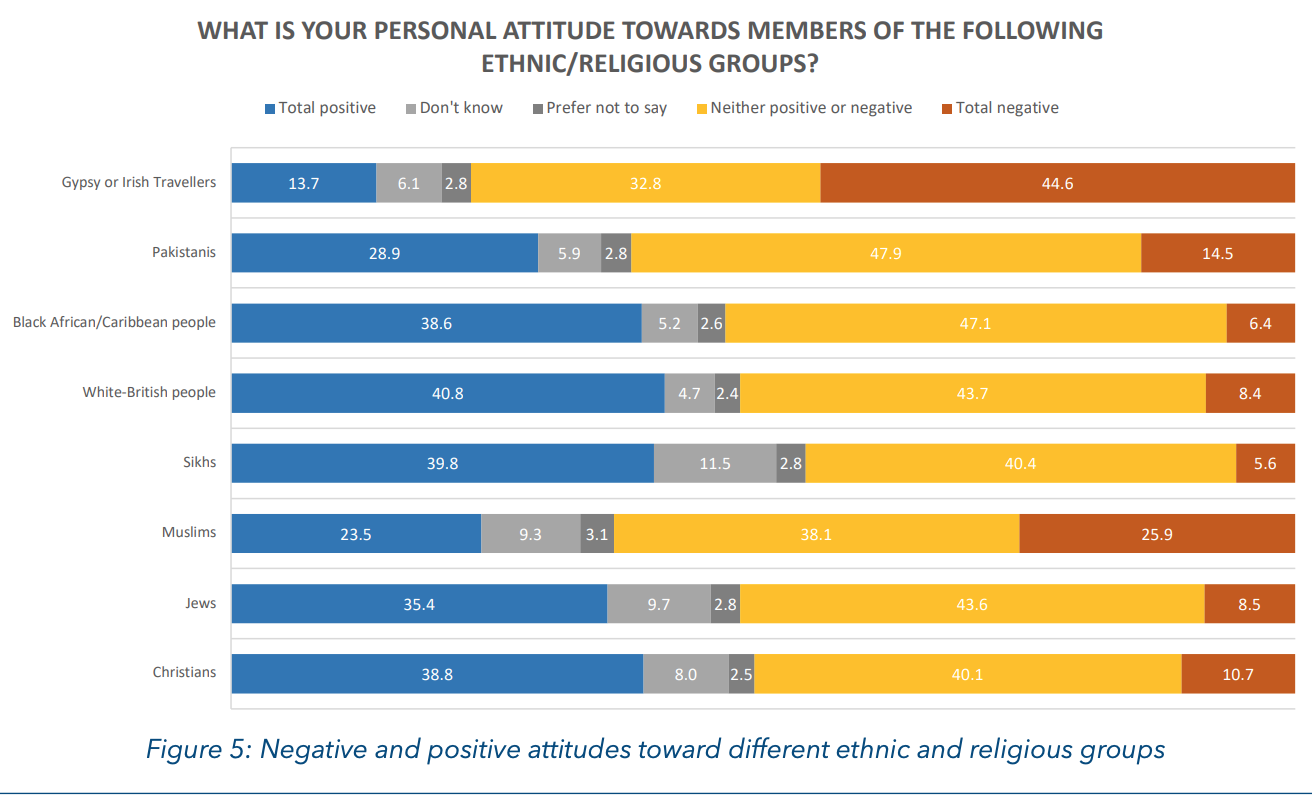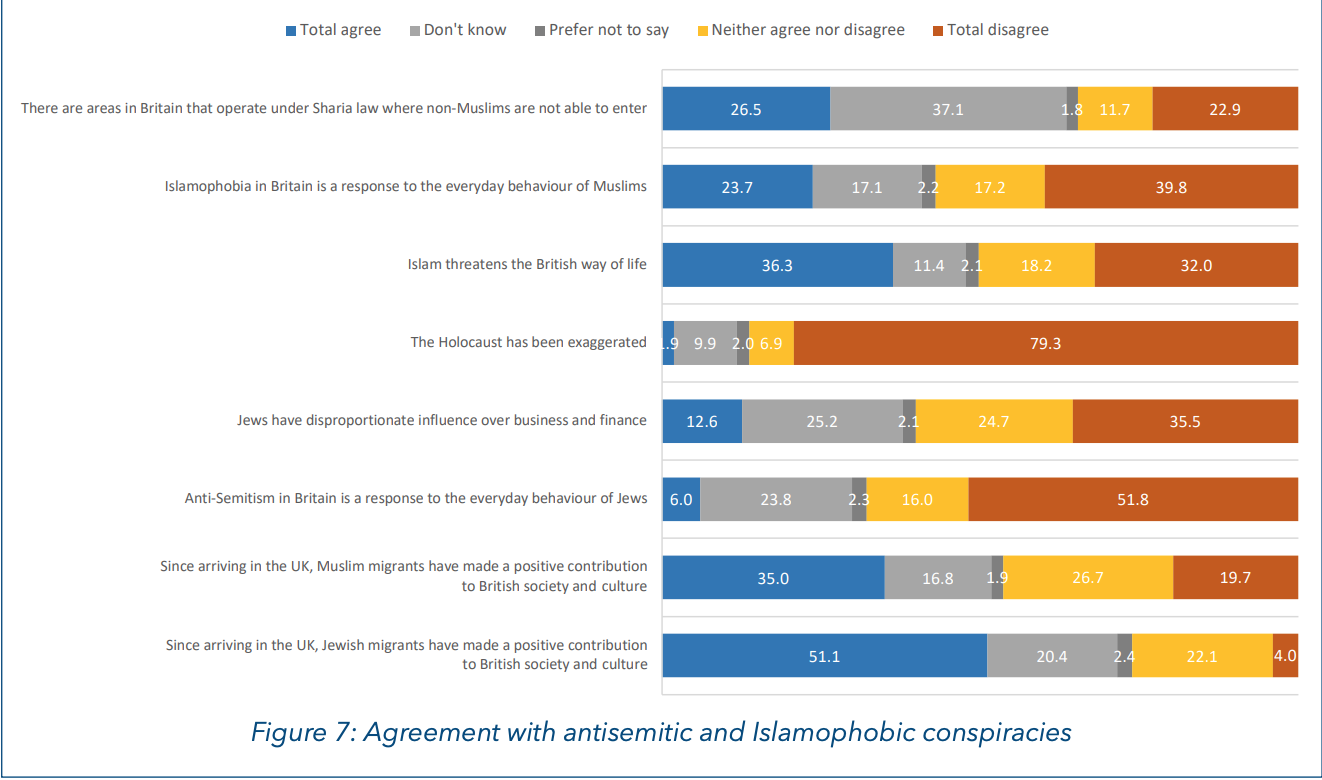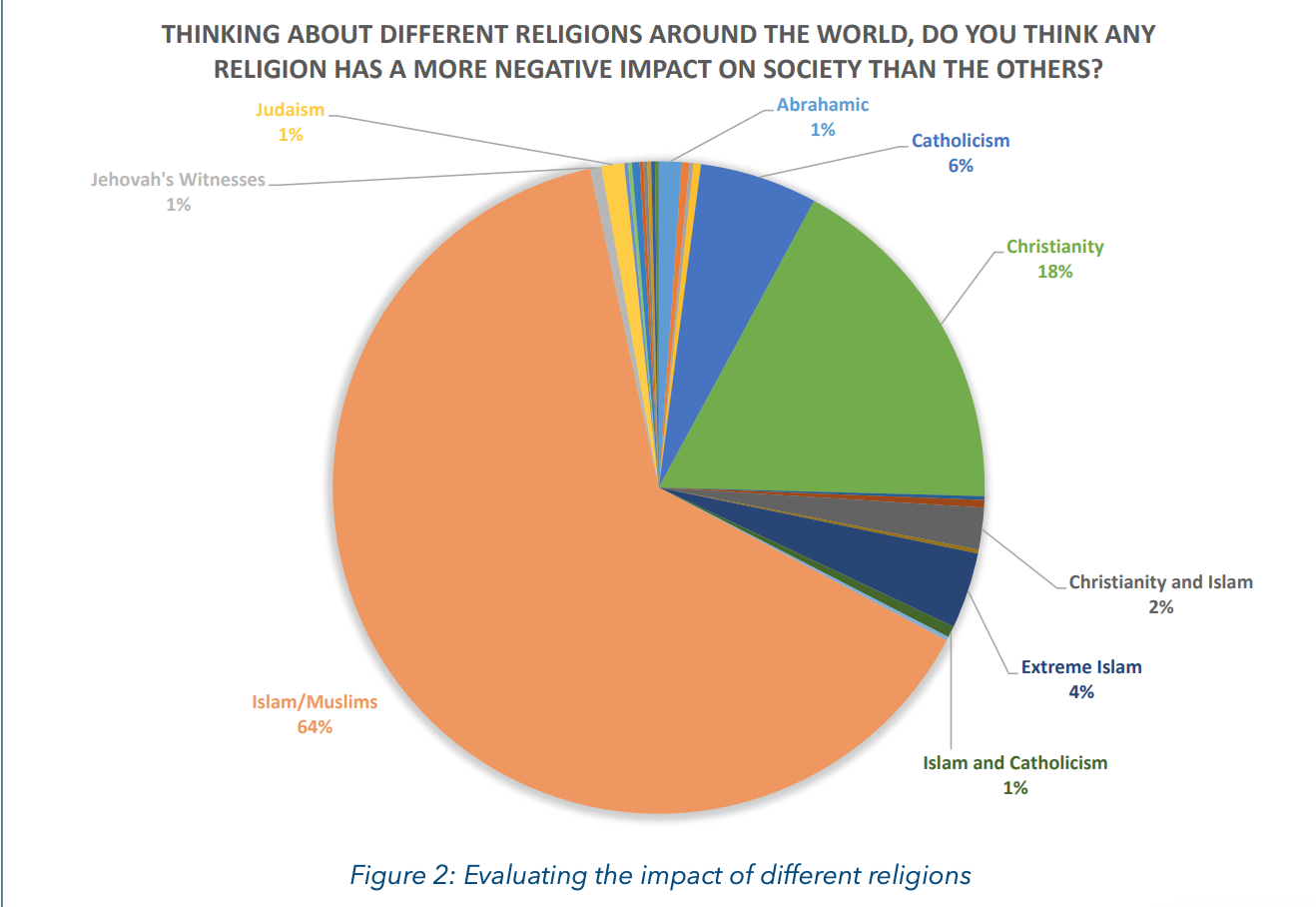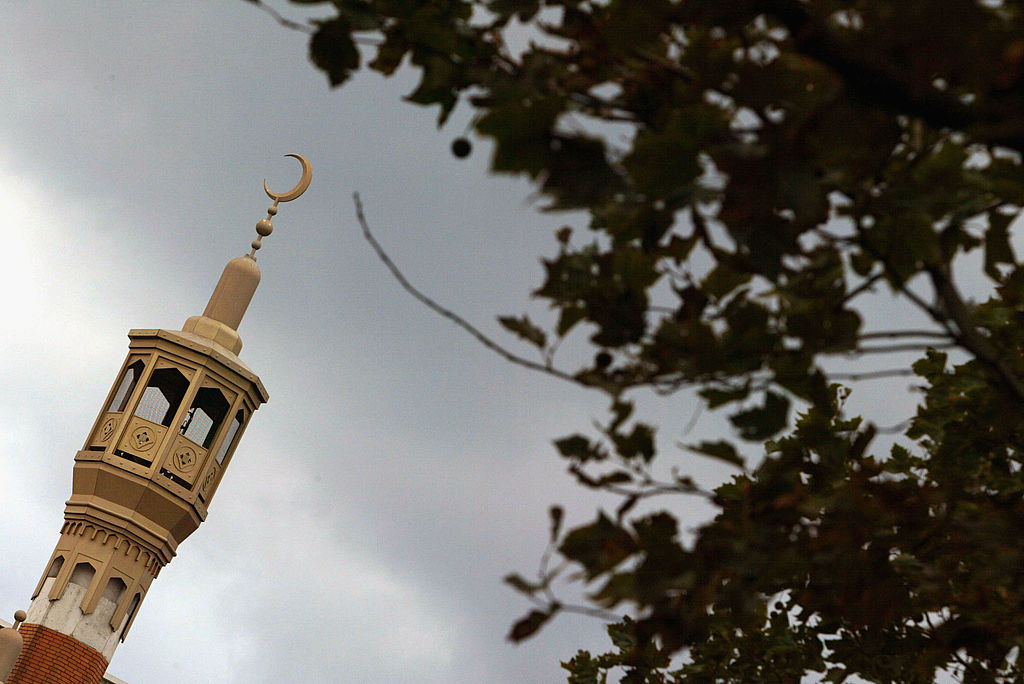In one of the most detailed surveys conducted on Islamophobia in Britain, a new report gives weight to the claim made in 2011 by former Tory chair Baroness Warsi that Islamophobia has ‘passed the dinner table test’ – extending beyond political extremes into middle-class domestic respectability.
The survey, presented in a report titled ‘The Dinner Table Prejudice: Islamophobia in Contemporary Britain‘, highlights the pervasiveness of Islamophobia in Britain today.
Prejudicial views about Muslims and belief in Islamophobic conspiracy theories is especially widespread among men, older people, Conservative and leave voters, and those from lower socio-economic backgrounds.
Meanwhile, middle and upper-class people are more likely to hold false and prejudiced views about Islam.
The report suggests that Islamophobia – whether it’s anti-Muslim or anti-Islam – is widely accepted in society and that means people commit it without there being much of a public outcry.
“Like most forms of prejudice towards ethnic and racial groups, anti-Muslim prejudice is much more common among specific demographics, notably men, older people, those in manual occupations and Conservative and Brexit voters,” says the report.
“Anti-Islamic prejudice, on the other hand, is more evenly spread across political persuasions and more common among higher social grades. It is, to borrow Baroness Sayeeda Warsi’s memorable phrasing, the UK’s ‘dinner table’ prejudice,” it adds.
Dr Stephen H. Jones from the University of Birmingham and lead author of the survey, which was carried out in conjunction with YouGov, says: “Prejudice towards Islam and Muslims stands out in the UK, not only because it is much more widespread than most forms of racism, but also because prejudice toward Islam is more common among those who are wealthier and well-educated.”
Here are six things from the report that you should know about
Lack of public censure for Islamophobia

Muslims are one of the ‘least liked’ ethnic and religious groups. 25.9% of respondents acknowledged negative attitudes towards Muslims, who came second to Gypsy and Irish Travellers at 44.6%, showing the scale of hostility towards the traveller community.
“Muslims and Gypsy and Irish Travellers are the two standout groups in the survey because more people evaluate them negatively than positively,” says the report.
The report adds that not only is there more discrimination against these two groups, but also there is less public sanction if someone openly acknowledges their dislike of either group.
“This is borne out in the contrasting way these two groups are discussed in public life,” says the report, which used the actions of Conservative MP Nadine Dorries as an example.
“The Conservative MP Nadine Dorries, for example, has supportively tweeted remarks made by Stephen Yaxley-Lennon, a.k.a. Tommy Robinson, the former leader of anti-Muslim street movement the English Defence League.”
“Unlike [Chris] Williamson, Dorries has never been forced to apologise for this by her party and indeed was, in 2021, promoted by Boris Johnson to a government role as Secretary of State for Digital, Culture, Media and Sport.”
Williamson, the former Labour MP, was expelled from the party and forced to apologise after supportively tweeting someone who is alleged to have made antisemitic comments.
Islamophobic conspiracy theories surpass any other

Anti-Muslim views and belief in outlandish conspiracy theories were prevalent:
- 23.7% agreed that ‘Islamophobia is a response to the everyday behaviour of Muslims’
- 36.3% agreed that ‘Islam threatens the British way of life’
- over a quarter of respondents agreed that there ‘are areas in Britain that operate under Sharia law where non-Muslims are not able to enter’
Compare that with conspiratorial or stereotyped statements about Jews; 6% of people agreed that ‘antisemitism is a response to the everyday behaviour of Jews’ and only 1.9% agreed with the most damaging antisemitic conspiracy theory, that the Holocaust is ‘exaggerated.’
“The question about Sharia law outlines an absurd conspiracy, one that merges together tabloid stories about ‘Sharia courts’ with rumours about the dangers of deprived inner-city areas,” says the report.
Islam viewed negatively versus other religions

One of the things the survey found was how Britain is not only non-religious but anti-religious. More British people agree than disagree, by a margin of almost two to one, with the claim that ‘religious people tend to be less rational than non-religious people.’
On the question of whether any specific religion has ‘a more negative impact on society than the others’, a staggering 64% of those who entered a response (31.1% of the overall sample) named Islam as the ‘most negative’ religion. A further 7% listed Islam alongside another religion or a subsection of Islam.
The next faith on the list was Christianity at 18%
The constant questioning of the word Islamophobia
“When Islamophobia is defined as racism, the definition is often brushed away with the claim that Islam is ‘not a race’. When it is defined in terms of religion, the same critics object that a religion is a body of ideas to which one may or may not subscribe, so should not be given the same protection as characteristics – like race or gender – which one cannot choose. The debate about Islamophobia has accordingly acquired a circular quality, with meaningful conversations on the subject struggling to get off the ground,” says the report.
The report adds that racism, antisemitism and Islamophobia have all been debated in recent years amidst the rise of the Black Lives Matter movement and controversies over antisemitism on the political left.
“Only in the case of Islamophobia, though, is the term itself regularly placed in question. Only in the case of Islamophobia do mainstream political commentators argue explicitly that there is ‘not nearly enough Islamophobia,'” says the report.
“Political conversations about the subject focus on terminology, with actual public expressions of Islamophobia rarely receiving attention and even more rarely facing any consequences,” it adds.
One of the reasons Islamophobia seems to elude recognition is due to the debate over whether it is religious prejudice or a something akin to racism.
The report uses data from the survey to argue that Islamophobia comes in both racial and religious varieties – i.e it is both anti-Muslim and ant-Islam.
It argues that Islamophobia cannot be understood or combatted without both these forms of prejudice being acknowledged.
“It is easy to see why taking ‘Islam’ out of ‘Islamophobia’ in this way is tempting. It seems to offer a solution to the problem of how to separate religious criticism and prejudice and thereby avoid stifling the former. We are not ultimately persuaded, however, that these two things can or should be fully separated,” explains the report.
How anti-Islam views slip into racism
Based on the survey and supporting interviews, the report says ‘religious Islamophobia acts’ are seen as the ‘acceptable face’ of anti-Muslim prejudice: “It is a ‘softer’ prejudice that stymies efforts to secure broad agreement on what Islamophobia is and how to challenge it.”
The study found that concerns about Islam can seamlessly slip into more racialised claims.
“What our data suggested was that, with religion not being subject to the same social sanction as remarks about race, culture, and discrimination, narratives about Islam as a belief system allowed liberal, middle-class participants to express anxiety about Muslims without fear of censure,” it says.
“Among conservative, libertarian or populist interviewees, stereotypes about Islamic belief often went hand-in-hand with cultural othering and sometimes overt racism.”
It says anti-Islamic prejudice offers an important support to anti-Muslim hostility, helping to normalise and minimise it.
Not understanding and challenging anti-Islamic prejudice means “facilitating the view that Islamophobia is regrettable, but ultimately comprehensible,” it adds.
Key finding and recommendations
The main findings of the report include:
- Muslims are the UK’s second ‘least liked’ group, after Gypsy and Irish Travellers
- More than one in four people, and nearly half of Conservative and Leave voters, hold inaccurate conspiratorial views about Sharia ‘no-go areas
- Support for prohibiting all Muslim migration to the UK is 4-6% higher for Muslims than it is for other ethnic and religious groups.
- The British public is almost three times more likely to view Islam as inherently literalistic than other religions
- British people are more confident in making judgements about Islam than other non-Christian religions but are much more likely to make incorrect assumptions about it:
- Islamophobia is not associated with Anglican identity, belief in God or practicing a religion:
- Hostility towards religion in general is significantly associated with prejudice towards Islamic belief
- People from middle and upper class occupational groups are more likely to hold prejudiced views of Islamic beliefs
The survey also has made specific recommendations to scale back the rise of Islamophobia:
- Government and other public figures should publicly acknowledge and address the lack of public criticism that Islamophobic discourses and practices trigger, and how Islamophobia stands out compared with other forms of racism and prejudice.
- Civil society organisations and equality bodies concerned with prejudice and discrimination should acknowledge that systemic miseducation about Islam is common in British society and forms an important element of Islamophobia.
- Educators should provide clear guidance clarifying when tropes about the Islamic tradition move from acceptable criticism to become harmful.
- Civil society organisations should introduce religious literacy as part of any large equality and diversity campaign or policy initiative.
- The BBC and other broadcasters should keep their commitments to religion programming, but with renewed emphasis on combatting intolerance.




